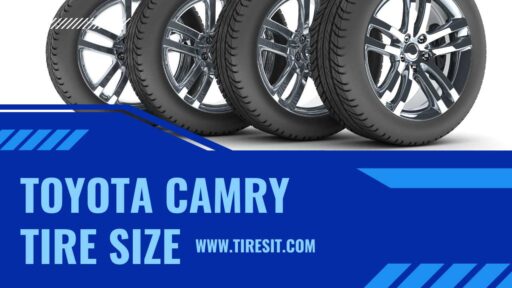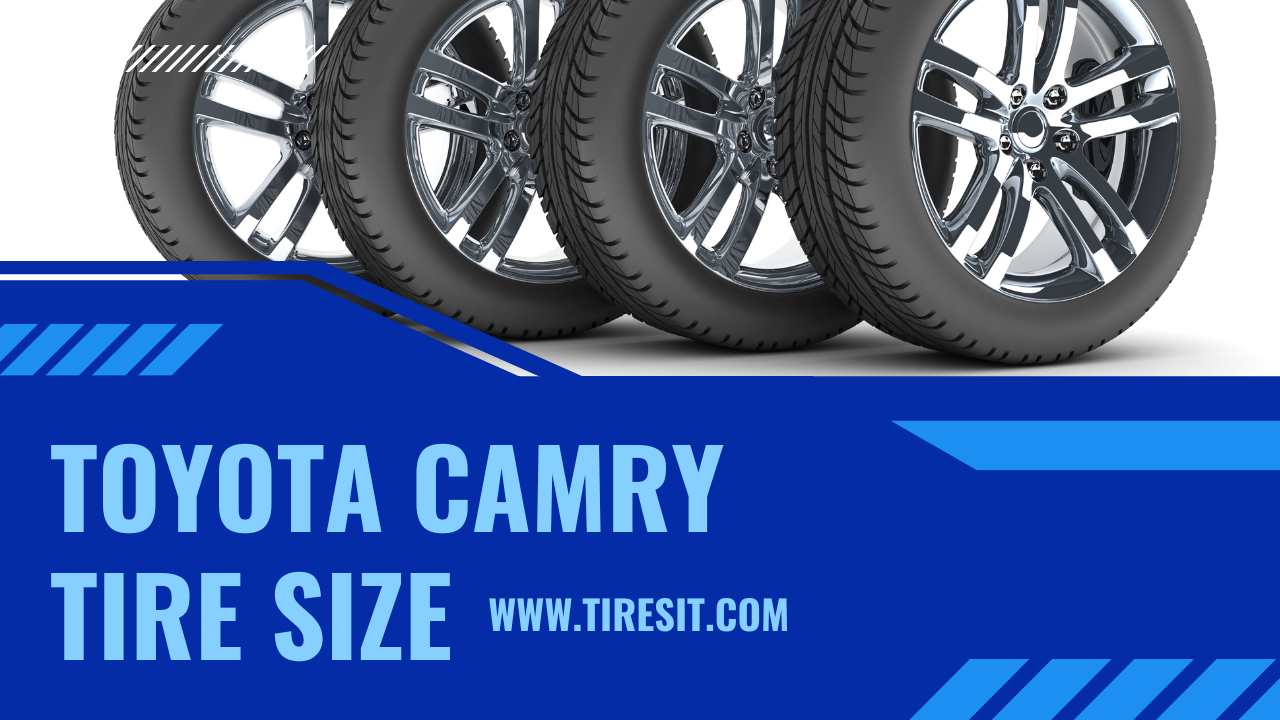Discover the perfect tire size for your Toyota Camry. Get accurate information and expert advice on tire dimensions, ensuring a smooth and safe ride.
If you own a Toyota Camry, getting the right tire size is one of your car’s maintenance tasks. Tire size has an impact on the overall performance, handling, and safety of the vehicle as a whole.
This guide covers Toyota Camry tire size. It explains why it matters. It covers how to understand size. It recommends sizes. It delves into factors for choosing the right size. It covers common myths. It explains how to check your size. It covers changing to a different size.
It looks at the pros and cons of changing your size. By the time we finish going through this guidebook with you will have understood why tire size matters so much in any given Toyota Camry.
Why Does Tire Size Matter?
The reason your Toyota Camry’s tire comes at a particular measurement cannot be overemphasized. First things first: It affects how well your car performs, generally speaking. With the right tire sizes, the grip is optimized.
This adds stability and control for better handling in many terrains and driving situations. The car’s fuel consumption may also be caused by its tire size. Bigger tires add to rolling resistance, reducing fuel economy. Smaller tires may fail to grip roads well, compromising safety and performance. A good balance between performance and fuel efficiency should therefore be struck when selecting appropriate tires for use.
Understanding Tire Size Measurements
To understand vehicle tire measurements, you must learn the alphanumeric codes. They are inscribed on the sidewalls of tires. For instance, the typical code for a Toyota Camry could read P215/60R16. The first letter “P” indicates that this type of tire belongs to the passenger cars category while the next three numbers signify its actual width in millimeters (mm) which is 215 mm when applied to this example.
These two digits, 60, refer to the proportion height to width ratio of the tire, which was 60%, for example. The “R” here means that these tires are radiated and widely used, while the last digit 16 indicates the wheel’s diameter.
Recommended Tire Sizes for Toyota Camry
Depending on the trim level or model, different versions of the Toyota Camry have their specific tire sizes. Here are some recommended sizes of tires for popular Toyota Camry models:
- Toyota Camry LE: P215/60R16
- Toyota Camry SE: P235/45R18
- Toyota Camry XLE: P215/55R17
- Toyota Camry XSE: P235/40R19

Credit: www.pexels.com
To get the correct tire size for your own personal Toyota Camry model and trim level, consult your car’s owner manual or approach a reliable mechanic. Using the right sized tires ensures that your car operates at its best and retains its intended balance between comfort, handling, and safety.
Factors to Consider When Choosing the Right Tire Size
Choosing the appropriate tire size for your Toyota Camry entails a few factors to consider. First, the vehicle’s intended function should be considered. A tire size that gives a comfortable ride and has low noise level would thus be preferred if you mostly drive in big cities.
Conversely, if you often travel in rough terrain or want to improve performance then it may be more appropriate to have them of a different size to ensure better grip and handling.
It is also wise to take into account the climatic conditions prevailing in your place of residence. For instance, if you reside in an icy location, tire sizes that accept snow chains or winter tires are important for your safety purposes.
Additionally, one needs to consider their driving tastes and lifestyle choices. In case sportier driving appeals to you, greater wheel dimensions can offer improved cornering ability and quicker response times. Nevertheless, bear in mind that bigger tires can worsen a harsher ride with more road noise.
Seasonal Variations
No single tire size fits all scenarios when it comes to Camrys, depending on where you live or the weather patterns experienced there might necessitate varying summer versus winter rubber sizes. Winter tires are usually narrower for focused grip while having higher sidewalls, which present better envelopment around the tire.
Performance vs Comfort
Are you craving for an exciting ride with tight grips or just want smooth controls as you cruise? You would need certain preferences when making such decisions since they will play a big part in a selection of tire sizes. Larger diameter tires may give better grip at corners but result into harder rides, whereas smaller ones could offer softer rides only.
Upgrading for Customization
Mostly, people tend to upgrade their car’s wheels without necessarily needing them so much when it comes to customizing their cars; hence choosing this path needs caution because changing tire sizes brings about speedometer accuracy issues among other factors such as suspension requirements and general weight distribution.
Impact on Driving Experience
Traction and Braking
A smaller set of tires can improve gas mileage as well as acceleration, but it might not offer the required traction to get you braking within reasonable distances. On the other hand, larger tires may make your stoppage time longer. It’s a delicate balance, and the correct tire size aims to strike it perfectly.
Handling and Stability
Selecting the right tire size will also improve how your Camry handles and stays planted on the road, with improved responses to driver inputs in various driving conditions.
Fuel Efficiency
The excellent fuel economy of Camry vehicles is something that their users are used to. Whenever you want to achieve this, then choose a tire size that reduces rolling resistance so as to minimize engine work in making the vehicle move forward.
Common Misconceptions About Tire Size
This sometimes leads car owners into thinking about tire sizes in an incorrect way since some commonly held untruths exist among them. One well-known false belief is that bigger wheels provide better performance all round for example cornering grip but this isn’t true at all because such tires can diminish ride comfort or even fuel efficiency.
Another idea many people have is that changing your tire size can greatly change the look of your car. This means that while having larger tire sizes can give your car a more aggressive and sporty appearance, it should be noted that this should be done within provisioned standards for maintaining performance as well as safety.
Checking Your Current Tire Size
To check the tire size you are currently using on your Toyota Camry, just find one of its side walls. As already mentioned, there will be a series of numbers and letters there. Write down everything in the alphanumeric code, including the letter at the beginning. This code stands for your tire size. Repeat this procedure for all four wheels to ensure consistency.
Changing to Another Tire Size
If you are thinking about switching to another tire size for your Toyota Camry, you should tread carefully. Although it may be tempting to make some changes to how the car looks or even enhance its functionality, not going by what has been recommended concerning tires is likely to bring about unintended consequences.
For example, bigger tire sizes may lead to speedometer inaccuracies, increased stress on suspension components and lower fuel efficiency; while smaller ones could affect handling and stability.
Alternatively, if you insist on going ahead with a different tire diameter consult an established tire specialist or garage mechanic who will offer expert guidance based on individual requirements and driving conditions so as to conform with most tire brands makes of cars.
Advantages and Disadvantages of Changing Your Tire Size
There are pros and cons associated with changing a tire size:
Pros: Better performance: Sometimes fitting bigger tires can generate more cornering grip and improve ride qualities, making them feel sportier.
More attractive: Larger tire sizes could improve the exterior appeal of Toyota Camrys, thus making them brighter when they pass along highways.
Cons: Reduced fuel mileage: Increasing rolling resistance due to large tyres enhances fuel consumption hence frequent trips to gas stations.
Less comfortable ride: The use of bigger tires will make the ride stiffer and noisier disturbing Toyota Camry’s overall comfort.
Inaccurate speedometer: These can show wrong readings as you drive and even get you into trouble with the law if you have changed to a different tyre size.
Straining suspension system and drivetrain: Drifting too far from tire size recommendations could strain your car’s suspension parts or drivetrain, thereby leading to cases of early tear and wear.
Maintaining Proper Tire Size for Optimal Performance
It is important to keep the correct tire size if you want your Toyota Camry to work optimally. Check your tires regularly for irregular tread wear patterns or bulges. If you see anything unusual, it may be an indication that your tires need replacing or aligning. Furthermore, adhere to the manufacturer’s recommended pressure settings at all times by checking and adjusting your tire pressures frequently. Good air pressure enhances better fuel consumption, longer durability for tires as well as improved handling.
Additionally, a change in tires every now and again, which is typically done every 5,000 to 8,000 miles, ensures the tire wears evenly and increases its lifespan. Lastly, take care of the load carrying capacity of your tires – overloading can put undue pressure on them leading to quick wear and other safety hazards that could emanate.
Tips for Selecting the Right Tire Size
Your Manual is Your Oracle
In case you are confused refer to your owner’s manual as your ultimate know it all guide that will tell you what kind of wheels would fit best your Toyota Camry.
Seek Professional Advice
However much information there might be out there; there is no substitution for professional advice. Experienced mechanics can give you their expert recommendation depending on the way you drive, normal road conditions and even characteristics of your Camry model.
Popular Brands for the Toyota Camry
There are certain brands known in the Camry community when it comes to tyres. Michelin, Bridgestone or Goodyear among other brands provides various types that meet different drivers owning a Camry.
Frequently Asked Questions About Toyota Camry Tire Size
Can I use a different tire size than the one recommended for my Toyota Camry?
While it may be possible to go for another tire size, it is generally better to opt for what the manufacturer recommends so that performance does not suffer.
How often should I check my tire size?
It’s always good to check your tire size whenever they wear abnormally or should be replaced. Additionally if you want to upgrade or make any changes; it is important also to verify your tires sizes.
Will changing my tire size void my vehicle warranty?
Changing only your tire size shouldn’t invalidate your car’s warranty, but if such modifications cause harm or affect how well your car performs then warranty covering has been affected.
Can I mix tire sizes on my Toyota Camry?
In most cases, it is advisable to use the same size for all four tires. However, refer to your user manual or a credible tire expert who can tell you if mixing sizes is allowed on the current model of Toyota Camry you own.
Conclusion
Lastly, getting to know and choosing an appropriate tire size for your Toyota Camry is very important as far as its performance, safety, and durability are concerned. This will help you make informed choices based on factors such as intended usage, weather conditions, and personal preferences, among others.
Whether going with the recommended tire size or looking for an upgrade, you must consult a reliable tire dealer who will give professional advice accordingly. Always remember the correct sizing of tyres; regularly inspecting them and sticking to manufacturer’s recommendation will make sure that your car serves you well for long time without any problems.
Note: The guide given above about Toyota Camry wheel size should be taken as general information only. Always consult your vehicle’s owner’s manual or a certified specialist for specific advice suited to your needs.





